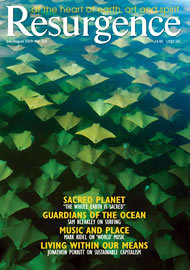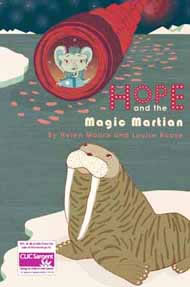HOW DO YOU tell children about the growing threat of human-induced climate change without (a) boring them, (b) scaring them, or (c) losing them halfway through your explanation? Well, one option would be to read them Hope and the Magic Martian by Bath-based eco-poet and environmental writer Helen Moore, who has written a lyrical tale about rising temperatures and love and hope in an increasingly uncertain world.
The story begins on Hope MacGregor’s tenth birthday, an “unusually warm day” in March. She receives a telescope as a present and as she peruses the red dim blob that is planet Mars from the comfort of her own back garden, she makes a wish that Martians will come to visit her soon. The very next morning her wish comes true. Martin Love, a diminutive Martian, appears magically at her side and soon whisks her away for an instructive trip to the North Pole. There, Hope and Martin take part in a meeting with all the Arctic animals: that is the crux of the story. The animals take turns to speak, and one by one recount the practical difficulties they are facing as a result of global warming.
First the arctic wolves explain that the “crazy weather” has meant that there aren’t enough voles or lemmings for them to eat. Every year they are getting thinner and having fewer pups, and as a result their packs are growing smaller. The seals then tell of how the sea-ice is melting earlier in the year and obliging them to swim away before their pups are strong enough to survive. And so it continues. The changing weather is interfering with these animals’ ability to travel, eat and procreate.
But it’s the arctic terns who bring Hope to tears. As the small birds fly across the globe they report on how they have seen evidence that human beings are “using machines to cut down forests and make their cities bigger and bigger”. How there are many more cars on the roads and aeroplanes in the sky, and how all these machines need oil in order to work. And that this oil is making the Earth hotter as it’s getting burned up. In other words, it’s the humans that are making this “crazy weather” happen.
Back home, Hope now sees things in a different light. She is scared that if she tells her friends and family what Martin has taught her about global warming, they will tease her, or not believe her. But she also recognises that they do listen to her, “especially if I ask for something when I’m in a good mood, or if I’m polite”. And this is perhaps the most compelling lesson we learn from Hope, her family and her diminutive Martian friend: the importance of being open to things we don’t understand or don’t know about. We, the readers, are asked to suspend cynicism, to be humble and, quite simply, to believe.
Eventually Hope decides to tell her father about the Martian and the terrible things that are happening to the planet. Her father discusses it with the rest of the family and things snowball from there. As Martin tells Hope, we soon find out that “everyone is a drop in a web”, and all the drops are connected by the threads that make up this great web. Soon Hope has her family, her friends, her school and even her whole town on board and devising new Energy Action Plans to help them lead greener, cleaner lives.
Hope and the Magic Martian is a tale that charms with its simplicity and poetry. In my view its most tantalising quality is that it is a compassionate and beautifully written call to effect change. I am not quite the target audience Moore had in mind, but I found the story heart-warming and entertaining. At the end of the book, when Martin has to go back to the barren planet of Mars (a victim of excessive greed and consumption after all the water was used up by its inhabitants), he leaves Hope with a message: “All you have to do when you’re feeling scared is to put your hand on your heart and feel the love that’s there.” The love Martin speaks of is love for others, the planet and oneself. •
Helen Moore’s new book Hope and the Super Green Highway is due to be published later this year.
Giovanna Dunmall is a freelance writer and journalist specialising in ecological issues.








